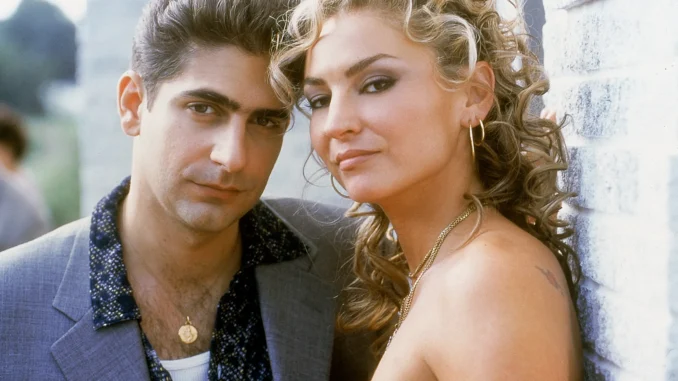
In the landscape of television drama, few moments resonate as profoundly as the death of Christopher Moltisanti in The Sopranos. This pivotal event not only marked a turning point for Tony Soprano but also encapsulated the series’ exploration of family, loyalty, and the destructive nature of crime. Christopher’s tragic arc reflects the complexities of his character and the brutal world he inhabited, making his demise one of the most impactful in the series.
Christopher Moltisanti: A Tragic Figure
From his introduction, Christopher Moltisanti was more than just a mobster; he was a man caught between the lure of organized crime and the yearning for validation. As Tony’s nephew and a potential heir to his criminal legacy, Christopher carried the weight of family expectations while struggling with his demons.
A Quest for Validation
Christopher’s journey is marked by his desire for approval from Tony, whom he viewed as a father figure after losing his own dad, Dickie Moltisanti. Throughout the series, we see Chris grapple with feelings of inadequacy and a longing for recognition. His early aspirations to become a screenwriter showcase his ambition and desire to escape the mob life. However, each time he strayed from Tony’s path, he found himself backsliding into a life of crime, addiction, and violence.
This push and pull between his dreams and Tony’s expectations created a tragic cycle. Christopher often sabotaged his own growth due to the pressures of being in Tony’s shadow, which only deepened his insecurities. When he finally did seek help through rehab, it was a brief flicker of hope—one that quickly dimmed as he returned to the toxic environment of the mob.
The Harsh Reality of Christopher’s Death
Christopher’s death in Season 6, Episode 18, titled “Kennedy and Heidi,” serves as the ultimate culmination of his struggles. After crashing their car while under the influence, Tony faces a choice: to help his nephew or to rid himself of a liability. In a chilling moment of betrayal, Tony suffocates Christopher, effectively snuffing out any chance of redemption.
The Emotional Weight of the Murder
This murder is haunting for several reasons. First, it starkly illustrates the depths of Tony’s moral decay. Here is a man who once viewed Christopher as a son, yet he ultimately sees him as a weakness—one that must be eliminated. The layers of emotional complexity add a heavy weight to the scene. Tony’s act is not just a business decision; it’s a deeply personal betrayal that echoes throughout the series.
Moreover, the audience is acutely aware of Christopher’s struggles for validation and acceptance. He sacrificed his relationship with Adriana, allowed Tony to manipulate him, and even facilitated the murder of his own fiancé. All these actions stemmed from his desperate need to please Tony, and in the end, it was this very loyalty that cost him his life.
The Aftermath: Tony’s Burden
Following Christopher’s death, the repercussions linger like a dark cloud over Tony Soprano. While he may outwardly project a sense of indifference, internally, he grapples with guilt and loss. This event serves as a significant turning point for Tony, marking the end of his humanity and empathy.
A Dream Haunting Tony
Tony’s struggle is encapsulated in a haunting dream sequence where he confronts the ghosts of those he has killed, including Christopher. This moment reflects the psychological toll of his actions and serves as a reminder of what he has sacrificed in his quest for power and control. The audience witnesses not just the physical elimination of Christopher but the emotional toll it takes on Tony, showcasing the complex layers of guilt that permeate his character.
The Tragic Irony of Christopher’s Journey
Christopher Moltisanti stands as a tragic figure not only for his untimely demise but also for his unfulfilled potential. He had dreams, aspirations, and the talent to break free from the criminal world, yet he was shackled by family loyalty and the mob’s inherent brutality.
The Paradox of Loyalty and Betrayal
While Tony represents the familial bonds that Christopher desperately sought, he also symbolizes the very forces that kept him trapped. Christopher’s death epitomizes the tragic irony of loyalty in the mob—one that often leads to betrayal. His attempts to navigate the dangerous waters of organized crime ultimately cost him his life, showing how the very relationships he valued became his undoing.
In many ways, Christopher’s journey serves as a cautionary tale about the dangers of misplaced loyalty and the perils of an unforgiving lifestyle. His struggle resonates with anyone who has faced the conflicting demands of family and personal ambition.
Conclusion: A Lasting Impact on The Sopranos
The death of Christopher Moltisanti in The Sopranos remains one of the most heart-wrenching moments in television history. It not only signifies the culmination of his tragic arc but also serves as a pivotal moment for Tony Soprano, marking a significant shift in his character’s trajectory.
Christopher’s story highlights the complexities of family dynamics, the pursuit of validation, and the consequences of a life steeped in crime. As we reflect on this moment, it’s clear that The Sopranos transcends the typical crime drama, delving into the depths of human emotion and the intricacies of loyalty and betrayal.
